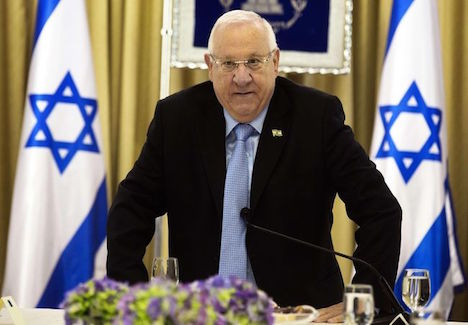|
By Gwynne Dyer
London Free Press
Sunday, Aug 9, 2015
 |
| Reuven Rivlin |
Reuven Rivlin, the president of Israel, is an outspoken man — but he knows when to hold his fire. He condemned the killing of an 18-month-old Palestinian child in an arson attack in the West Bank by suspected Jewish settlers last Friday as “terrorism,” but he did not say that the suspects are from the extreme wing of the “national-religious tribe”.
Rivlin has not yet commented publicly on the knife attack on gay-pride marchers in Jerusalem the previous day that wounded six people (one of whom has now died of her wounds). But if and when he does, he will not point out that the accused killer, Yishai Schlissel, belongs to the extremist fringe of the “Haredi tribe,” the ultra-Orthodox Jews who do not recognize the legitimacy of the state of Israel.
It would be wrong to use language that paints all members of the “tribes” in question as accomplices in these murders, because they aren’t. Even if some of them sympathize with the actions of the murderers (and some probably do), it would still be a political mistake to alienate them further.
But maybe we should re-phrase that last sentence, because in Rivlin’s view there no longer is an Israeli mainstream. There once was, when secular Jews — mostly of Eastern European origin — formed the majority of the population and everybody else belonged to “minorities.” Higher birth rates among those minorities have turned the secular Jews into just another minority — and Rivlin says they should all be seen as “tribes.”
He said all this two months ago, in a startlingly frank speech to the Herzliya conference, an annual event where the country’s leaders debate issues of national policy. “In the 1990s,” he told them, “Israeli society comprised . . . a large secular Zionist majority, and beside it three minority groups: a national-religious minority, an Arab minority, and a Haredi minority.”
“Although this pattern remains frozen in the minds of much of the Israeli public, in the press, in the political system, all the while, the reality has totally changed. Today, the First Grade classes (in Israeli schools) are composed of about 38 per cent secular Jews, about 15 per cent national religious, about one-quarter Arabs, and close to a quarter Haredim.”
Demographic changes, Rivlin said, have created a “new Israeli order . . . in which Israeli society is comprised of four population sectors or, if you will, four principal ‘tribes,’ essentially different from each other, and growing closer in size. Whether we like it or not, the makeup of the ‘stakeholders’ of Israeli society, and of the State of Israel, is changing before our eyes.”
The most important implication is that barely half of the children now in Israeli primary schools will grow up to be Zionists. The Arabs will not, of course, but neither will the Haredim, the ultra-Orthodox Jews who believe the Zionist project to recreate Jewish rule in Israel is blasphemous. Only God can do that, they say, by sending the Messiah, and the Zionist attempt to hurry it along by human means is a rebellion against God.
The Zionist tribes are also divided between the secular Zionists and the “national-religious” tribe. The latter reconcile their Orthodox religious beliefs with the Zionist project by arguing that it was God who inspired the early Zionists in eastern Europe to build a Jewish state in Palestine. Most Jewish settlers on the West Bank, and most of their supporters in Israel proper, belong to this tribe.
All these former minority tribes are to some extent alienated from the secular, liberal-democratic Zionist assumptions that underpin Israel’s political structure. A few members of each tribe are already so alienated that they turn to violence.
Rivlin didn’t say that explicitly — it’s too upsetting — but he was pointing out that the emperor has no clothes. The secular-Zionist domination cannot continue; the other tribes must also come to feel safe and welcome in a different kind of Israel — specifically, in a “one-state” Israel that includes all the territory between the river Jordan and the Mediterranean Sea.
It’s so radical, it almost makes sense.
It’s just hard to believe that it could actually happen.
Dr Gwynne Dyer is an independent Canadian journalist whose articles are published in 45 countries.
Source URL
|
 Print This Print This

|

